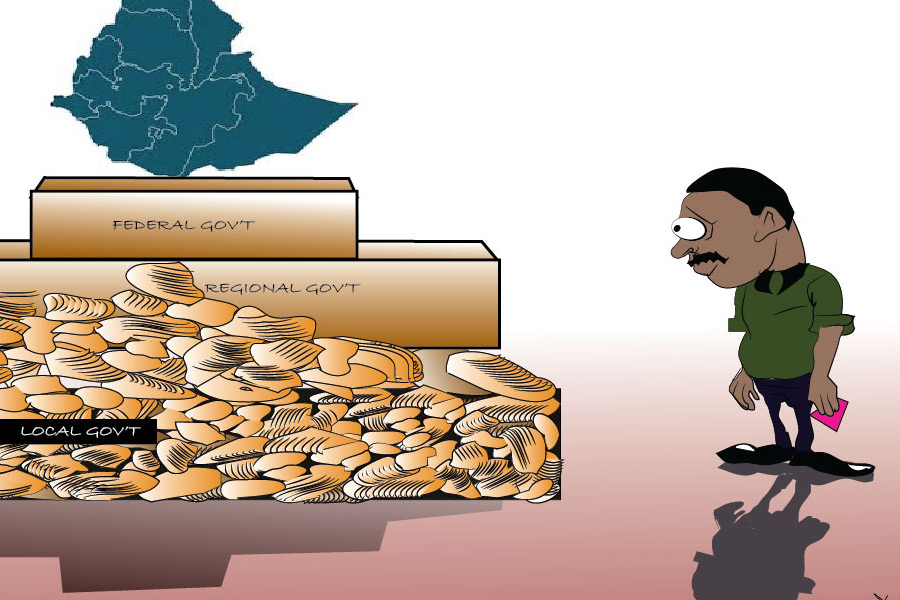
Editorial | Dec 10,2018
May 29 , 2021
By HAWI DADHI
The upcoming national polls will not see voters casting ballots in 14pc of the constituencies across the country. A total of 76 constituencies, including the 38 in the Tigray Regional State, where elections are not planned for this year, will not be part of the sixth national elections scheduled for June 21, 2021.
Officials of the National Electoral Board of Ethiopia (NEBE), chaired by Birtukan Mideksa, announced last week their decision not to conduct elections in 38 constituencies struggling with severe security issues, including four constituencies in Benishangul Gumuz, 14 in Somali, seven in Oromia, eight in Amhara, three in the southern regional state, and two in Harari regional states. The decision will mean that more than half of the constituencies in the Somali Regional State, where an estimated 6.5 million people live, will not be represented, while Benishangul Gumuz, home to around 1.5 million people, is also facing a similar fate.
When Parliament convenes in October 2021, there is fear over 15.5 million people will be unrepresented for the first time in 25 years, a major setback for the Board.
Around 36.2 million voters have been registered to cast ballots at more than 46,000 polling stations, but this number might differ if registrations in certain areas are kicked off and upon conclusion of auditing of voters` registrations, which the Board is currently conducting. Over 9,300 candidates have been registered for seats in regional councils and the federal Parliament. The Prosperity Party leads the flock with 2,799 candidates, followed by EZEMA`s 1,540.
With new legislation passed in 2019 and Birtukan's return from the US to head the Board, the electoral board has undertaken restructuring that was hoped to meet expectations to conduct free, fair, and credible elections in 547 constituencies. The largest, 178, is in Oromia Regional State, followed by Amhara (138) and southern regional state (123). Somali Regional State and Addis Abeba have 23 constituencies each. While the number of constituencies in the peripheral states varies from nine to two, Tigray Regional State has 38 seats in parliament, but voters cannot exercise their constitutional rights due to the civil war raging there since November 2020. The latest assessment conducted in April 2021 by the International Organisation for Migration (IOM) reveals that there are 1.6 million people displaced within Tigray.
But it is not the only part of the country that election officials have deemed unsuitable for polling.
In parts of Benishangul Gumuz, areas where conflicts have been reported since 2019, including Metekel, there will not be elections conducted. The situation has escalated in the past few months, leaving more than 150,000 people displaced, and the area has been under military command beginning January this year. An estimated 500 people have lost their lives there since August last year, the Ethiopian Human Rights Commission (EHRC) report disclosed.
"The government is not adequately doing its job to guarantee security for the people," Seifesilassie Ayalew (PhD), deputy president of Enat Party, which has fielded the third-largest number of 605 candidates, told Fortune.
Conflicts in the Somali, Afar, and Amhara regional states have been recurring, too.
These conflicts might not be contained within these constituencies, according to Eyasped Tesfaye, a political analyst. He foresees that it may get difficult for the electoral officials to hold the elections in other regional states.
The board announcement concerning 11 constituencies in Somali Regional State, where irregularities in voters` registrations were reported by contesting parties, might have informed Eyasped's sullen view. The Board has formed a committee composed of its directors, lawyers, and representatives of civil societies to look into these allegations.
There has also been a dispute between the Board and the Harari Regional Government after electoral officials declined to let members of the Harari community residing outside of the regional state vote for the regional assembly, a practice that has been common during the past five elections. Earlier this week, justices at the Federal Cassation Bench upheld a ruling by the Supreme Court, allowing Harari voters to cast ballots to vote for the regional assembly, despite their legal residence elsewhere.
Despite the mishap, however, Seife Selassie believes elections in the rest of the country should go ahead while voting in the missing constituencies can be delayed, citing that the government is unlikely to address the security concerns in time.
"Though it will likely have an impact on voters' decision making, I don't believe delays will lead to a constitutional crisis," he said.
Eyasped disagrees.
"Elections across the country should be concluded before mid-August, which coincides with the postponement made by parliament last year," said Eyasped. "Failure to do would result in a constitutional crisis."
PUBLISHED ON
May 29,2021 [ VOL
22 , NO
1100]

Viewpoints | May 15,2021

Commentaries | Nov 07,2020

Fortune News | Jul 13,2020

Editorial | Jan 09,2021

Editorial | Jun 26,2021

Dec 22 , 2024 . By TIZITA SHEWAFERAW
Charged with transforming colossal state-owned enterprises into modern and competitiv...

Aug 18 , 2024 . By AKSAH ITALO
Although predictable Yonas Zerihun's job in the ride-hailing service is not immune to...

Jul 28 , 2024 . By TIZITA SHEWAFERAW
Unhabitual, perhaps too many, Samuel Gebreyohannes, 38, used to occasionally enjoy a couple of beers at breakfast. However, he recently swit...

Jul 13 , 2024 . By AKSAH ITALO
Investors who rely on tractors, trucks, and field vehicles for commuting, transporting commodities, and f...

Jul 5 , 2025
Six years ago, Ethiopia was the darling of international liberal commentators. A year...

Jun 28 , 2025
Meseret Damtie, the assertive auditor general, has never been shy about naming names...

Jun 21 , 2025
A well-worn adage says, “Budget is not destiny, but it is direction.” Examining t...

Jun 14 , 2025
Yet again, the Horn of Africa is bracing for trouble. A region already frayed by wars...